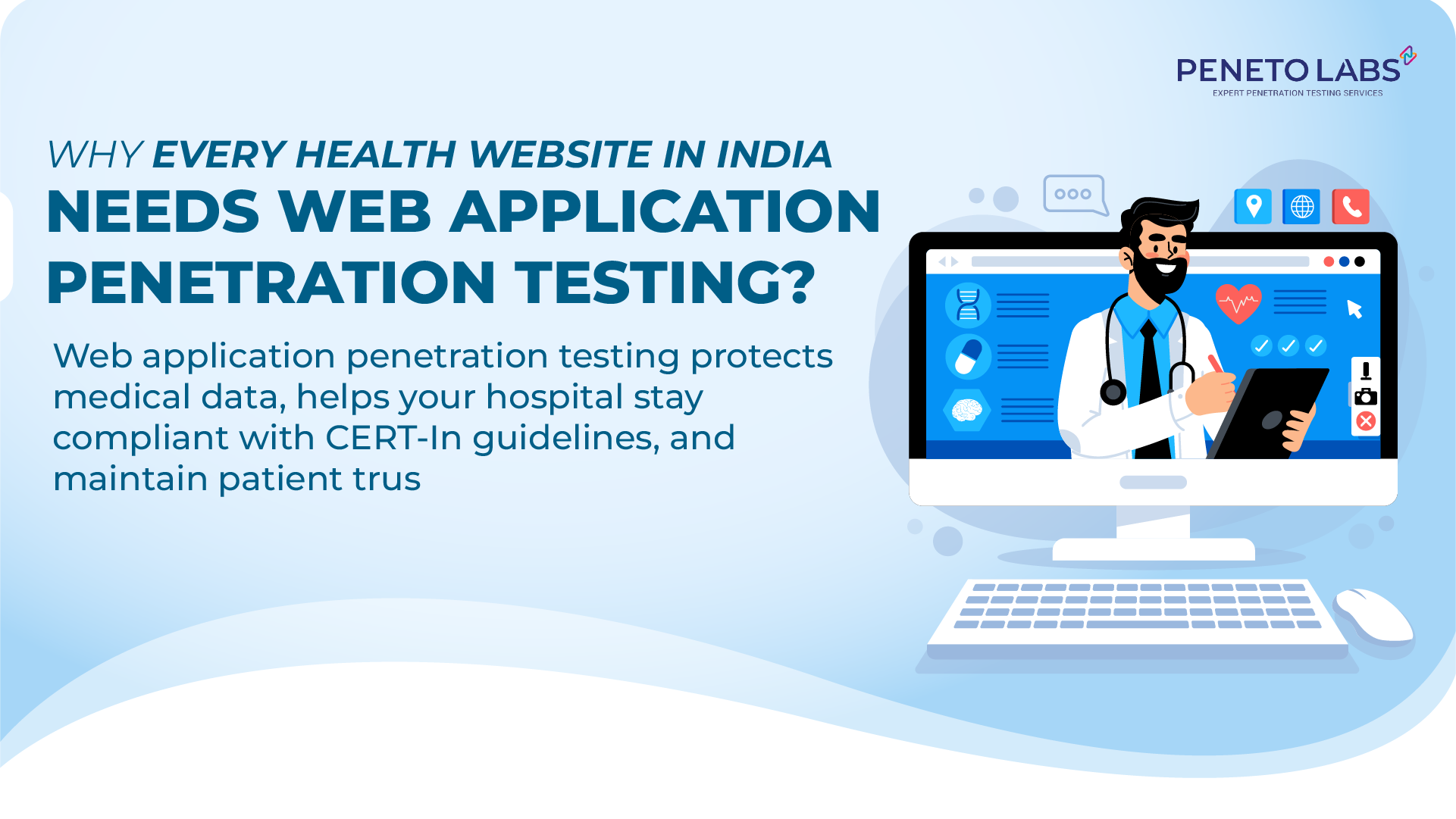In present modern times, health websites have made it easy to book online doctor consultations and maintain one’s digital health records. Thus, they have contributed significantly to digital convenience and are transforming how Indians access healthcare. However, with this comfort, there are also chances of cyber risks and cyberattacks which can be prevented by Web Application Penetration Testing.
Sensitive medical data, including patient history, prescriptions, and personal identifiers, has become a prime target for hackers. Web Application Penetration Testing of any healthcare website ensures patient trust, regulatory compliance, and data security.
The Rising Cyber Risks for Health Website
Medical data is one of the most important assets on the dark web. Unlike credit card data that can be changed, medical history and personal identifiers are permanent. Attackers exploit vulnerabilities in:
- Cloud storage configurations
- Login and authentication systems
- Insecure communication channels
- Payment gateways for medical services
- APIs connecting patient records and labs
A single breach can lead to identity theft, blackmail, and loss of patient trust. The primary way to protect your health websites from such breaches is through Web application penetration testing.
What Is Web Application Penetration Testing for a Health Website?
Web application penetration testing is a simulated cyberattack carried out by certified professionals. Unlike automated scans, web application penetration testing combines manual testing and advanced tools to uncover deep logic flaws, chained exploits, and overlooked weak points.
For health websites, this means proactively testing the security of patient portals, online consultation modules, mobile APIs, and payment integrations.
Professional Web Application Penetration Testing Ensures Following Security Best Practices
- Strong Authentication & Authorization prevents account takeovers and misuse of medical data.
- secure APIs ensure patient data isn’t leaked through poorly secured APIs.
- Block SQL Injection & XSS which prevents attackers from injecting malicious queries or stealing session data.
- Configured Cloud Storage protects medical reports, images, and prescriptions from exposure.
- Encrypted Communication secures sensitive health data during transmission.
Why Health Website in India Cannot Skip Web Application Security Testing?
1. Patient Data Protection
Medical records, prescriptions, and diagnostic results are highly sensitive. Web application security testing ensures that no unauthorized entity can access or leak this data.
2. Compliance With CERT-In and Health Regulations
India’s CERT-In compliance guidelines mandate timely reporting and secure handling of data breaches. Regular web application penetration testing helps health websites stay compliant and audit ready.
3. Preventing Financial Fraud
Health websites often integrate wallets, UPI, and card payments. Web application penetration testing secures these transactions against fraud, chargeback scams, and payment gateway exploitation.
4. Building Trust with Patients
Users trust health websites with their most private details. A secure and tested app builds credibility, making patients more likely to continue using it.
5. Avoiding Reputation Damage
Even a single breach can cause irreparable damage to the reputation of a healthcare brand. Web application penetration testing helps prevent such costly incidents.
How Web Application Penetration Testing Works for a Healthcare Website?
1. Scoping: Identify modules like patient logins, doctor dashboards, APIs, and payments.
2. Testing: Conduct both manual and automated checks for vulnerabilities.
3. Exploitation Simulation: Test how a hacker could chain vulnerabilities for deeper access
4. Reporting: Deliver compliance-ready reports with clear risk severity and remediation guidance.
5. Retesting: Validate fixes to confirm the app is safe to host.
Why Choose Peneto Labs for Health App Security?
Peneto Labs is a cybersecurity company with strong expertise in web application penetration testing for healthcare platforms. Peneto Labs has been empanelled by CERT-In to conduct information security auditing services.
Our team of certified pentesters (OSCP, OSCE, GCIH, GWAPT) has worked with hospitals, telemedicine website, insurance providers, and health startups across India. At Peneto Labs, we believe that no company should suffer from cyberattacks.
What sets us apart is our unique blend of manual and automated web application penetration testing, providing comprehensive coverage that goes beyond basic scans. We provide compliance-ready reports aligned with CERT-In and healthcare security guidelines, along with free retesting within the audit window to confirm fixes.
Our support includes Safe-to-Host readiness so you can launch or update your website with confidence, and we work directly with your development and compliance teams for faster remediation.
Final Thoughts
Failing to secure Health websites puts patients, doctors, and the business itself at enormous risk. Web application penetration testing protects medical data, helps your hospital stay compliant with CERT-In guidelines, and maintain patient trust.
Regular web application security testing ensures that your platform remains safe, compliant, and trusted. If you operate a healthcare website, get in touch with Peneto Labs today to protect it from malicious hackers.
